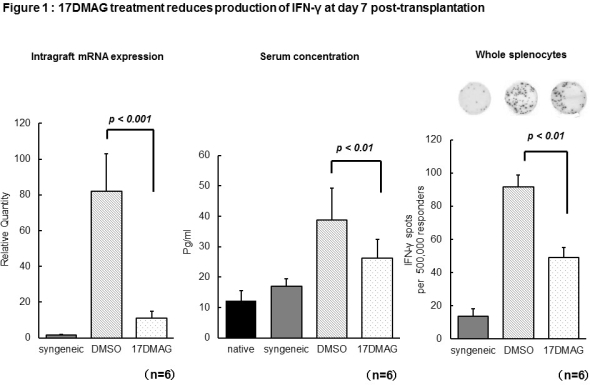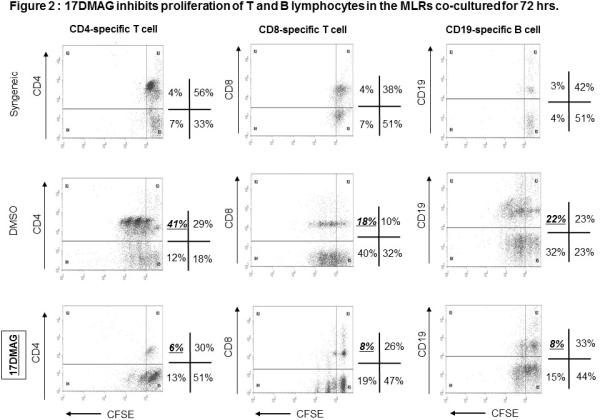Heat Shock Protein 90 Inhibitor 17DMAG Is a Potential New Therapeutic Agent Against Acute Allograft Rejection.
1Urology, Sapporo Medical University School of Medicine, Sapporo, Japan
2Urology, Graduate School of Medicine and Pharmaceutical Sciences for Research, University of Toyama, Toyama, Japan.
Meeting: 2016 American Transplant Congress
Abstract number: B18
Keywords: Heat shock proteins, Immunosuppression, Mice, Skin transplantation
Session Information
Session Name: Poster Session B: Allograft Rejection, Tolerance, and Xenotransplantation
Session Type: Poster Session
Date: Sunday, June 12, 2016
Session Time: 6:00pm-7:00pm
 Presentation Time: 6:00pm-7:00pm
Presentation Time: 6:00pm-7:00pm
Location: Halls C&D
Purpose: We have previously demonstrated that Heat shock protein 90 (HSP90) plays a role in the development of acute rejection (AR) in organ transplantation. To date, the immunosuppressive effect of HSP90 inhibitors in solid organ and tissue transplantations remains unknown. The aim of this study was to investigate the immunosuppressive effect of the HSP90 inhibitor 17DMAG in murine skin transplantation (STx). Methods: C57BL/6 (H-2b) and BALB/c (H-2d) mice were used as donors for and recipients of STx, respectively. Treatment with 17DMAG (1mg/kg daily i.p.) or DMSO as a vehicle was initiated three days before STx. Histopathological evaluation (Banff 2007), flow cytometric analysis, quantitative RT-PCR, ELISA and ELISPOT assay were performed on day 7. CFSE-based mixed lymphocyte reactions (MLRs) using splenocytes were performed on day 14. Results: In 17DMAG-treated mice, allograft survival was significantly longer than in the vehicle group (median survival time: 14.0 days vs. 9.5 days, log-rank p<0.0001). The Banff grade of skin allografts at day 7 was significantly lower in the 17DMAG group than in the vehicle group (median grade 1.5 vs. 2.5, p<0.01). In 17DMAG-treated mice, intragraft mRNA expression, the serum concentration of IFN-γ, and donor-reactive splenocytes producing IFN-γ were significantly reduced.  In MLRs analysis, 17DMAG significantly inhibited the proliferation of CD4 and CD8 T lymphocytes and CD19 B cells.
In MLRs analysis, 17DMAG significantly inhibited the proliferation of CD4 and CD8 T lymphocytes and CD19 B cells.  Conclusions: Our study suggest that HSP90 may play a role in regulating the differentiation and activation of T and B cells and the production of IFN-γ in STx. HSP90 inhibition by 17DMAG may have therapeutic potential against acute rejection in allotransplantation.
Conclusions: Our study suggest that HSP90 may play a role in regulating the differentiation and activation of T and B cells and the production of IFN-γ in STx. HSP90 inhibition by 17DMAG may have therapeutic potential against acute rejection in allotransplantation.
CITATION INFORMATION: Maehana T, Tanaka T, Kitamura H, Masumori N. Heat Shock Protein 90 Inhibitor 17DMAG Is a Potential New Therapeutic Agent Against Acute Allograft Rejection. Am J Transplant. 2016;16 (suppl 3).
To cite this abstract in AMA style:
Maehana T, Tanaka T, Kitamura H, Masumori N. Heat Shock Protein 90 Inhibitor 17DMAG Is a Potential New Therapeutic Agent Against Acute Allograft Rejection. [abstract]. Am J Transplant. 2016; 16 (suppl 3). https://atcmeetingabstracts.com/abstract/heat-shock-protein-90-inhibitor-17dmag-is-a-potential-new-therapeutic-agent-against-acute-allograft-rejection/. Accessed February 9, 2026.« Back to 2016 American Transplant Congress
